
Kathy
in Memos & Musings · 6 min read
What is the book about?
“The Misbehavior of Markets” by Benoît B. Mandelbrot challenges traditional financial theories by introducing fractal geometry to analyze market behavior. Mandelbrot argues that markets are not as predictable as conventional models assume and that they exhibit complex, self-similar patterns at different time scales. The book critiques the efficient market hypothesis and advocates for a more realistic understanding of financial markets, emphasizing the role of randomness and nonlinearity.
Key takeaway lessons include the importance of embracing uncertainty, acknowledging the limitations of traditional financial models, and recognizing the relevance of fractal geometry in describing market dynamics. Mandelbrot’s work encourages investors and financial professionals to adopt a more nuanced approach to risk management and decision-making in the unpredictable world of financial markets.
Here are some takeaways and possible learning points:
Takeaway #1
Fractal Insights for Market Dynamics
In “The Misbehavior of Markets,” Mandelbrot introduces the groundbreaking concept of fractal geometry to understand market fluctuations. He argues that market patterns exhibit self-similar structures across different time scales, challenging traditional linear models. This takeaway emphasizes the importance of adopting a more comprehensive and nuanced approach to analyzing market behavior, acknowledging the intricate fractal nature that conventional models often overlook.
Takeaway #2
A Critical Examination of the Efficient Market Hypothesis
Mandelbrot critically examines the Efficient Market Hypothesis, asserting that markets are not always rational or efficient. By scrutinizing real-world market data, he highlights the limitations of traditional financial models that assume a consistent and predictable market. This takeaway encourages readers to question established theories and be aware of the inherent complexities and irrationalities that shape financial markets.
Takeaway #3
Fat Tails and the Significance of Extreme Events
“The Misbehavior of Markets” introduces the concept of fat tails, highlighting the increased likelihood of extreme events in financial markets. Mandelbrot’s insights underscore the importance of acknowledging and preparing for such rare yet impactful occurrences. This takeaway emphasizes the need for risk management strategies that consider the potential impact of extreme events on investment portfolios.
Takeaway #4
Diversification as a Robust Risk Mitigation Strategy
Mandelbrot underscores the significance of diversification as a robust risk mitigation strategy in the unpredictable world of financial markets. By constructing portfolios that are resilient to unexpected market movements, investors can reduce their exposure to concentrated risks. This takeaway advocates for a balanced and diversified approach to portfolio management to enhance overall risk-adjusted returns.
Takeaway #5
Long-Term Memory and Past Events’ Influence on Future Behavior
Mandelbrot introduces the concept of long-term memory in market movements, suggesting that past events have a lasting impact on future market behavior. This takeaway prompts a reevaluation of the efficient market hypothesis and emphasizes the persistence of certain patterns over time. Investors are encouraged to consider historical data in their decision-making processes to navigate the long-term dynamics of financial markets.
In summary, we also have some actionable advice that we believe investors may benefit from:
Embrace Diversification and Robust Risk Management
Incorporate diversification into your investment strategy as a means to mitigate risks associated with market misbehavior. Build a well-balanced portfolio that encompasses various asset classes and industries, thereby reducing vulnerability to extreme events and unexpected market movements in any specific sector or industry. Implement robust risk management practices, taking into account the concept of fat tails and the increased likelihood of extreme events. Investors should consider regularly reassessing and rebalancing their portfolio to adapt to evolving market conditions and different stages of the market cycle, ensuring resilience against uncertainties.
While we can diligently study companies and analyze markets extensively, the reality is that the market can remain illogical for longer than we can remain solvent. It’s crucial to learn to invest in a manner that contains losses if we are wrong and allows for outsized gains if we are right. Risk management becomes paramount in this scenario, ensuring that our investment approach is designed to navigate the unpredictable nature of the market.
Adopt a Realistic and Adaptive Approach to Decision-Making
Recognize the limitations of traditional financial models and embrace the fractal and nonlinear nature of markets. Develop an understanding of randomness in market movements and avoid over-reliance on deterministic views. Examples may include instances where artificial intelligence is booming, but it does not necessarily guarantee future success for semiconductor stocks, as seen with investors rushing to buy stocks like Nvidia, thinking that they will continue to skyrocket. Similarly, the expectation of lower interest rates doesn’t automatically ensure success for all stocks or REITs. Investors may be tempted to buy into hype at prices that do not offer compelling value.
Investors must be adaptive in their decision-making process, acknowledging the long-term memory of markets and incorporating historical data into their analyses. Technical analysis, when done correctly, can be helpful in this aspect. Stay informed, continuously learn, and remain flexible in response to the dynamic and unpredictable nature of financial markets. By adopting these strategies, investors can navigate market misbehavior with a more realistic and resilient approach.


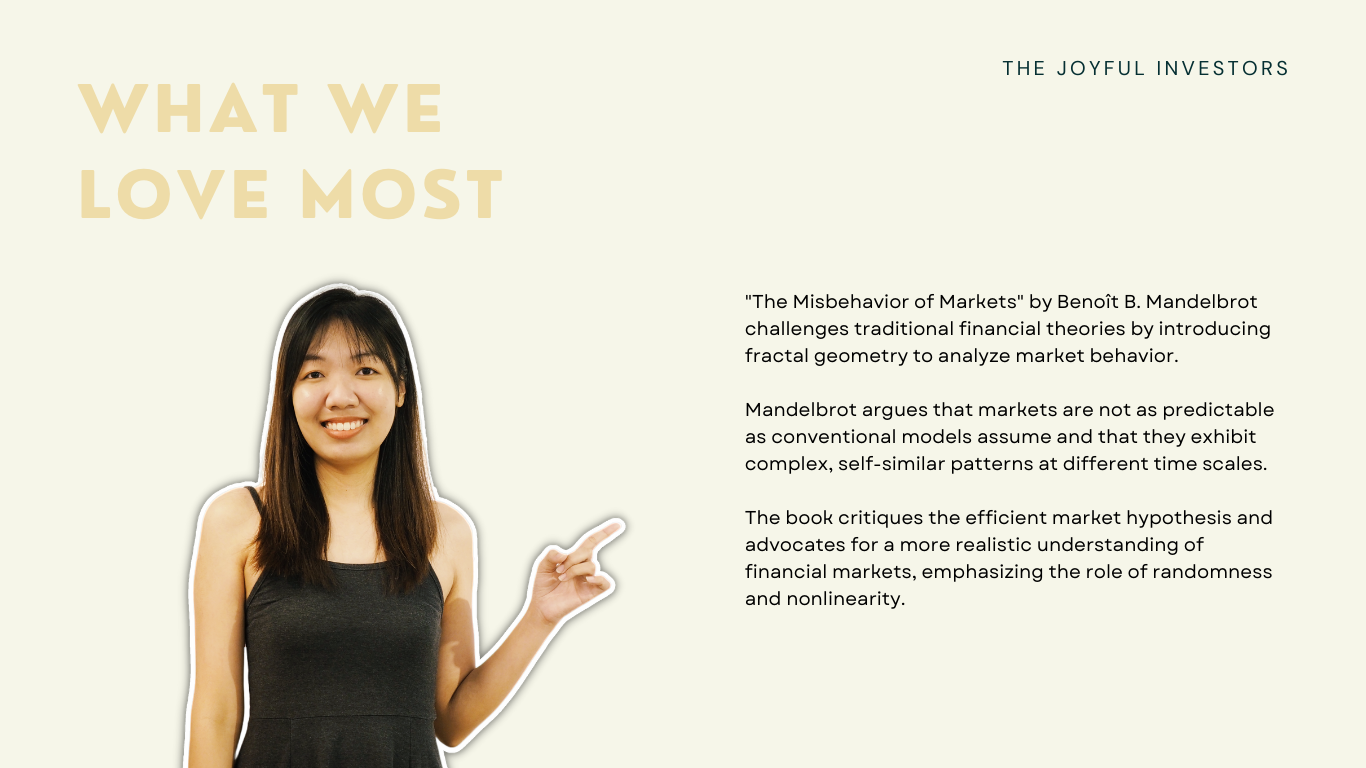

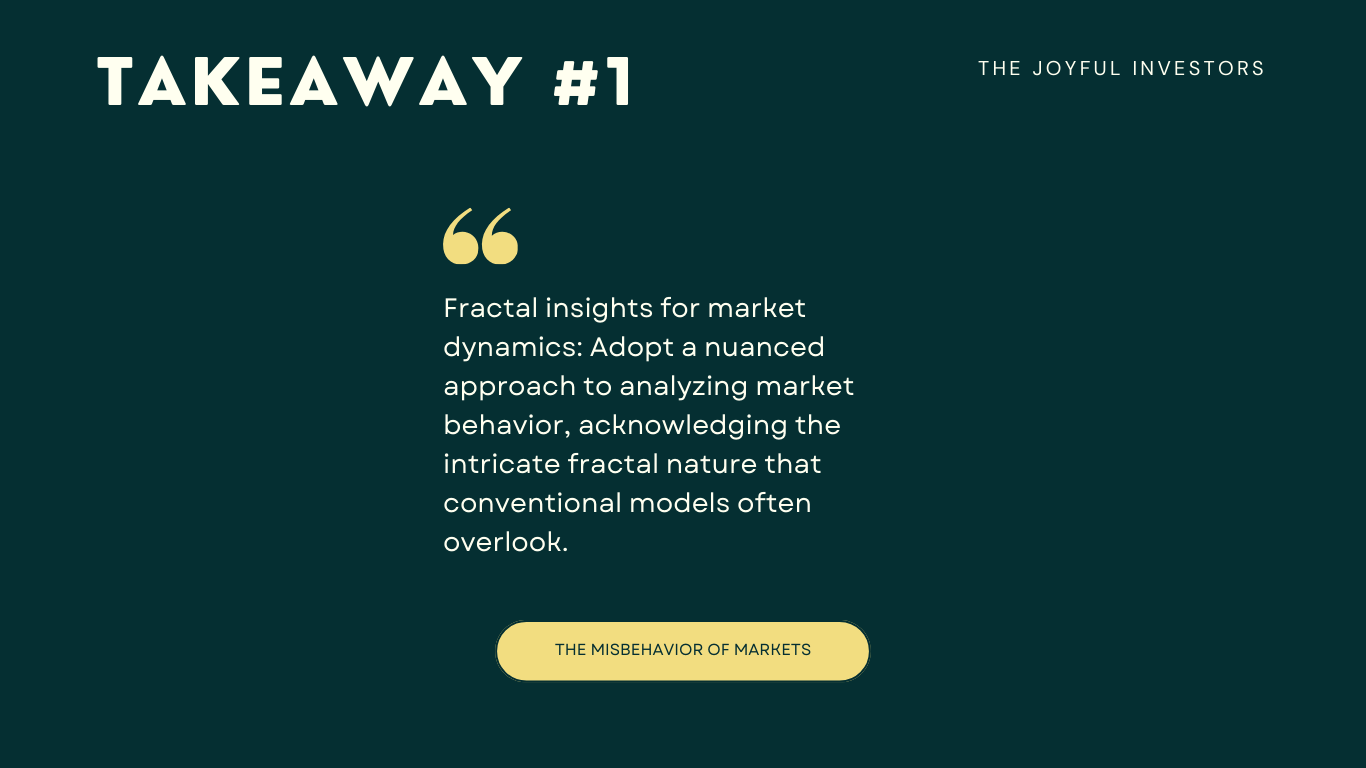

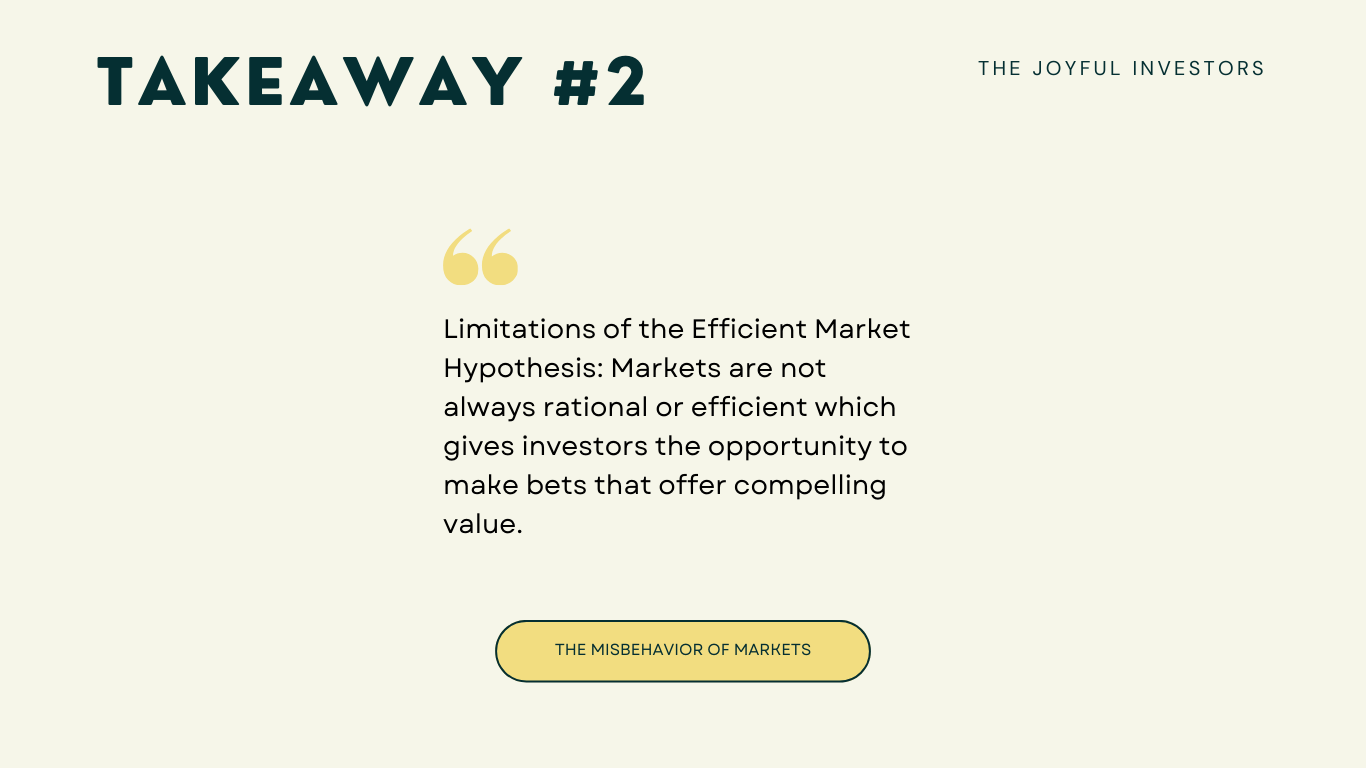

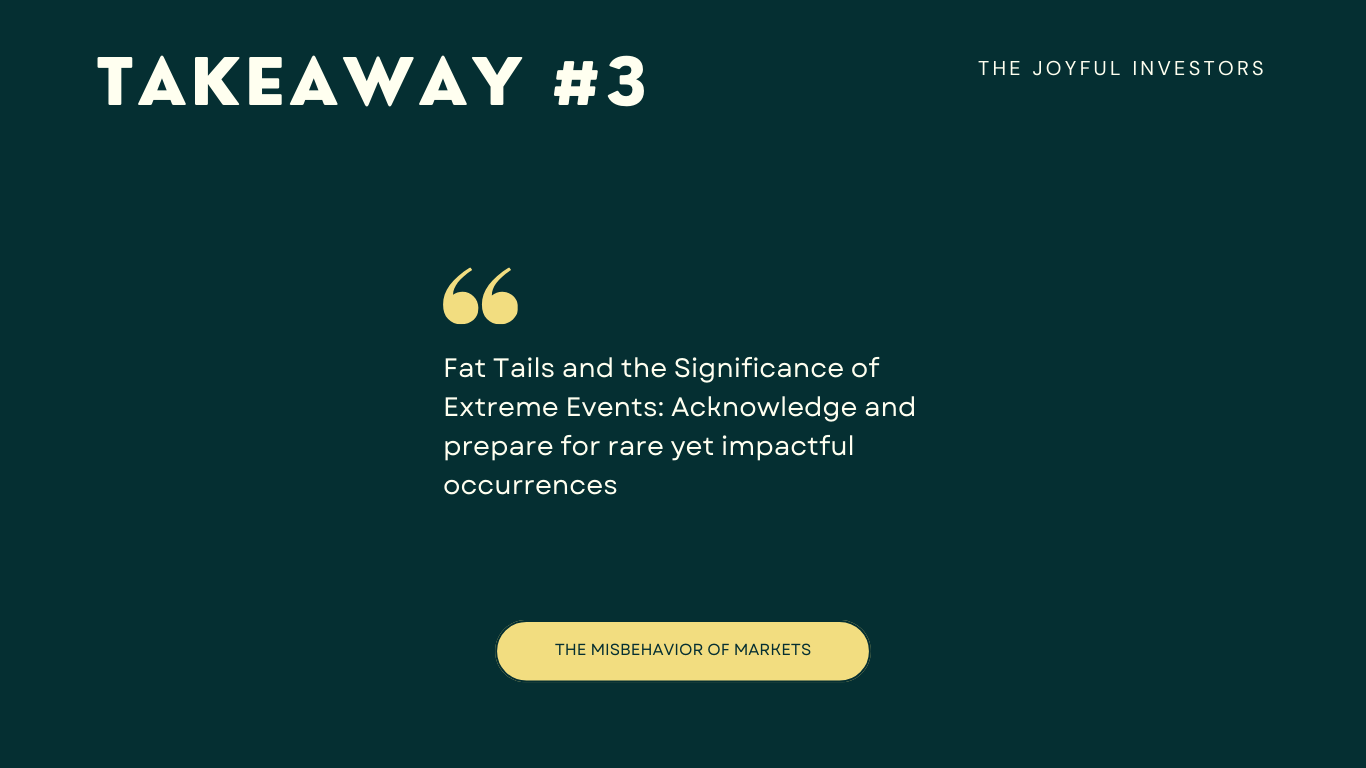

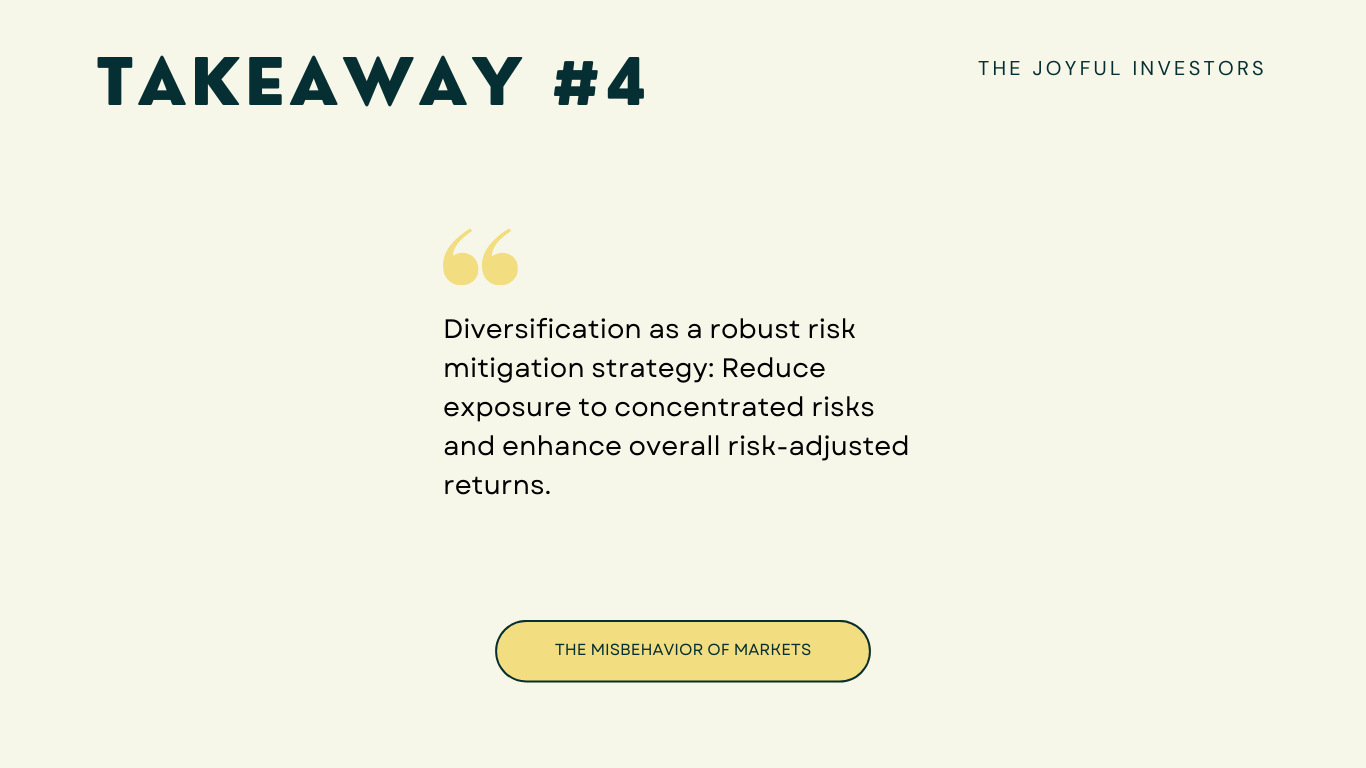





Joyful Reviews is a series by The Joyful Investors where we will be sharing our thoughts and insights on books or films that focus on personal development and investing knowledge to help everyone become a more confident and thoughtful investor. We believe that continuous education and self-improvement are key to success in any area of life, and especially in the world of investing.



About Kathy
Co-Founder of The Joyful Investors and Co-CIO of InvestingNote Portfolio. I graduated with a degree in Economics in National University of Singapore (NUS). My previous experience with traders at the Merrill Lynch enable me to realize many counter-intuitive truths about how the financial markets work and to uncover the challenges faced by many new investors. Investing can be astoundingly simple, and my goal is to make financial education accessible and easy to understand for everyone.
Important Information
This document is for information only and does not constitute an offer or solicitation nor be construed as a recommendation to buy or sell any of the investments mentioned. Neither The Joyful Investors Pte. Ltd. (“The Joyful Investors”) nor any of its officers or employees accepts any liability whatsoever for any loss arising from any use of this publication or its contents. The views expressed are solely the opinions of the author as of the date of this document and are subject to change based on market and other conditions.
The information provided regarding any individual securities is not intended to be used to form any basis upon which an investment decision is to be made. The information contained in this document, including any data, projections and underlying assumptions are based upon certain assumptions and analysis of information available as at the date of this document and reflects prevailing conditions, all of which are accordingly subject to change at any time without notice and The Joyful Investors is under no obligation to notify you of any of these changes.
· · ·
Have you enjoyed this article? We’d be grateful if you would share this useful content to your friends who may benefit from it as well.



